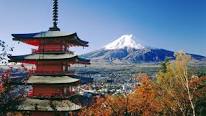 I just returned from an amazing adventure: a week spent in Japan. My journey took me to the capital, Tokyo, where I spent three days visiting temples, parks, and interesting parts of the city. Japan is a very modern nation, with highly planned and regimented cities that offer a sense of peace and order not found in Western metropolises. In addition to Tokyo, I traveled to Kyoto, the nation's ancient capital, and explored the region, camping by a small town near a great lake. On the final day, I woke up with the sun and hitch hiked back to Tokyo. The Japanese people I met along the way were extremely friendly and accommodating, and I think that I could spend some years living there. While Japan's present is interesting, the country's history is almost incredible. While the islands that make up Japan have been settled for tens of thousands of years, they have remained relatively isolated for much of this time. For example, during the reign of the Tokugawa shogunate, a rule that lasted for over 260 years, foreigners were only allowed to trade with Japan in one port, and very few received imperial support. However, that all changed in 1853, when an American commodore named Matthew Perry sailed to Japan with heavily armed ships. He ignored the emperor's requests and demanded that Japan open up a trading relationship with America. This event was met with alarm throughout Japan. Many Japanese people at the time believed that the emperor was a god, so it was almost unbelievable that a man like Perry might ignore the emperor. Within the span of fifty years, Japan became a highly advanced modern nation, one that had a complex system of railroads and telegraphs, highly respected medical and scientific institutions, and a powerful navy. Along with this quick rise to power, the Japanese developed a highly imperialistic form of nationalism, one that lead to aggression and war. During World War II, the Japanese sided with the Axis powers, and fought viciously until the atomic bomb destroyed Hiroshima and Nagasaki. Then, after the war, America restructured Japan again, this time finding a way to instill values of peace and productivity in the nation. Now, many of the world's cars and electronics come from Japanese companies. This roller-coaster ride would have been impossible for anyone to imagine just 150 years ago.
1 Comment
|
Adam De GreeI am a senior in college, studying philosophy, and am visiting family in the Czech Republic and travelling and studying in Europe and Asia. Archives
January 2016
Categories
All
|
|
SUPPORT
|
RESOURCES
|
|


 RSS Feed
RSS Feed



